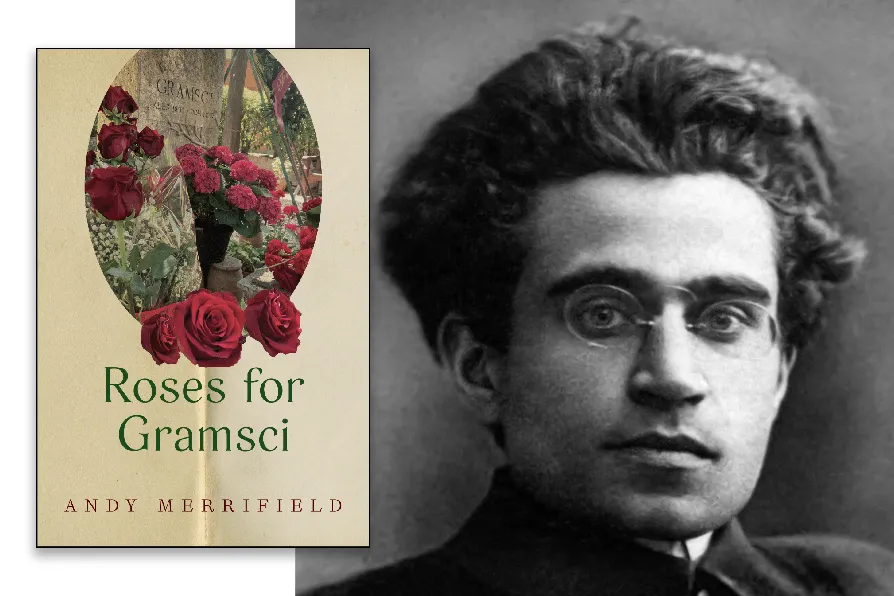GORDON PARSONS applauds a marvellous story of human ingenuity and youthful determination, well served by a large and talented company
SETH SANDRONSKY savours a personal account of the life and thought of the great Italian revolutionary

 Portrait of Antonio Gramsci aged around 30 in the early 20s [Pic: Public Domain]
Portrait of Antonio Gramsci aged around 30 in the early 20s [Pic: Public Domain]
Roses for Gramsci
Andy Merrifield, Monthly Review Press, £23.26
ANTONIO GRAMSCI, imprisoned under the fascist Italian dictator Mussolini between World Wars I and II, would have understood the popular appeal of Donald Trump.
Andy Merrifield’s new book presents a nuanced personal and political portrait of the late Sardinian activist and author that seamlessly demonstrates his cultural and theoretical significance. There is much to reflect on and savor in eight chapters.
In crisp and lyrical prose, Merrifield tells how he ended up spending time tending to the gravesite of Gramsci in Rome’s Non-Catholic Cemetery. This experience launches a journey to amplify the significance of a major figure of resistance to oppression. From Gramsci’s sickly childhood to his entry into economics and politics, Merrifield fleshes out the relevant actors and factors shaping that development.
Gramsci, one of six children of a hard-working single mother, endured no small measure of scorn for his diminutive stature from peers. I took from Merrifield that Gramsci developed his patience from his mother, a strength of character that helped him to survive an 11-year prison sentence. She was his emotional rock.
While imprisoned, Gramsci wrote his famous Prison Notebooks, a classic of revolutionary thought, for which Merrifield provides context, including the intellectual influence of Gramsci’s friend Piero Sraffa, the Marxist economist and colleague of John Maynard Keynes. Sraffa, along with Tatiana Schucht, Gramsci’s sister-in-law, provided the link to society outside the prison walls.
Gramsci’s idea of cultural hegemony, or how the ruling ideas dominate a society, builds on Marx’s notion of false consciousness, which derives from the ways in which the prices of commodities conceal the human labour contained in them. From Gramsci’s perspective, workers’ culture — past and current practices of labouring and living — are also factors in their attraction to powerful authority. It is a complex mix.
Ruling class ideas prevail in social institutions such as the church, the press and schools. With rare exceptions, it is indoctrination rather than education that rules the roost in this status quo.
As a communist, Gramsci was an internationalist, and Merrifield sheds light on his coining of the term “subaltern” to describe the indigenous inhabitants of imperial colonies. Gramsci was also a realist, writing about the “Southern Question” in Italy. The country’s southern region is primarily an agricultural economy, with a population less civilised, according to bigoted thinking. Ruling interests can and do exploit such differences for reasons of social control and exploitation of labour.
Such a cultural strategy of divide and conquer has a history in the US, and takes the form of patriarchy and white supremacy. The historical case of the American South and its role as the centre of slaveholding and the Confederacy’s “lost cause” returns as red state support for Trump now. Mobilising white workers under economic attack to fear and hate non-white labourers is a key feature of such rule.
The legacy of Gramsci speaks volumes. Merrifield introduces us to many people who pay their respects to the Sardinian original, leaving heartfelt notes and roses at his final resting place. Merrifield wraps up the book by ruminating on what Gramsci’s life might have been like if he had been free from imprisonment.
The author’s black-and-white photographs throughout bring a unique visual dimension to the book, although a table of contents and index would help readers to better navigate Merrifield’s literary ode. But Gramsci remains a thinker for our time, and this personal history helps us to understand his life of principled resistance to tyranny.
Seth Sandronsky is a Sacramento journalist and member of the freelancers unit of the Pacific Media Workers Guild. Email: sethsandronsky@gmail.com.

RON JACOBS salutes a magnificent narrative that demonstrates how the war replaced European colonialism with US imperialism and Soviet power











